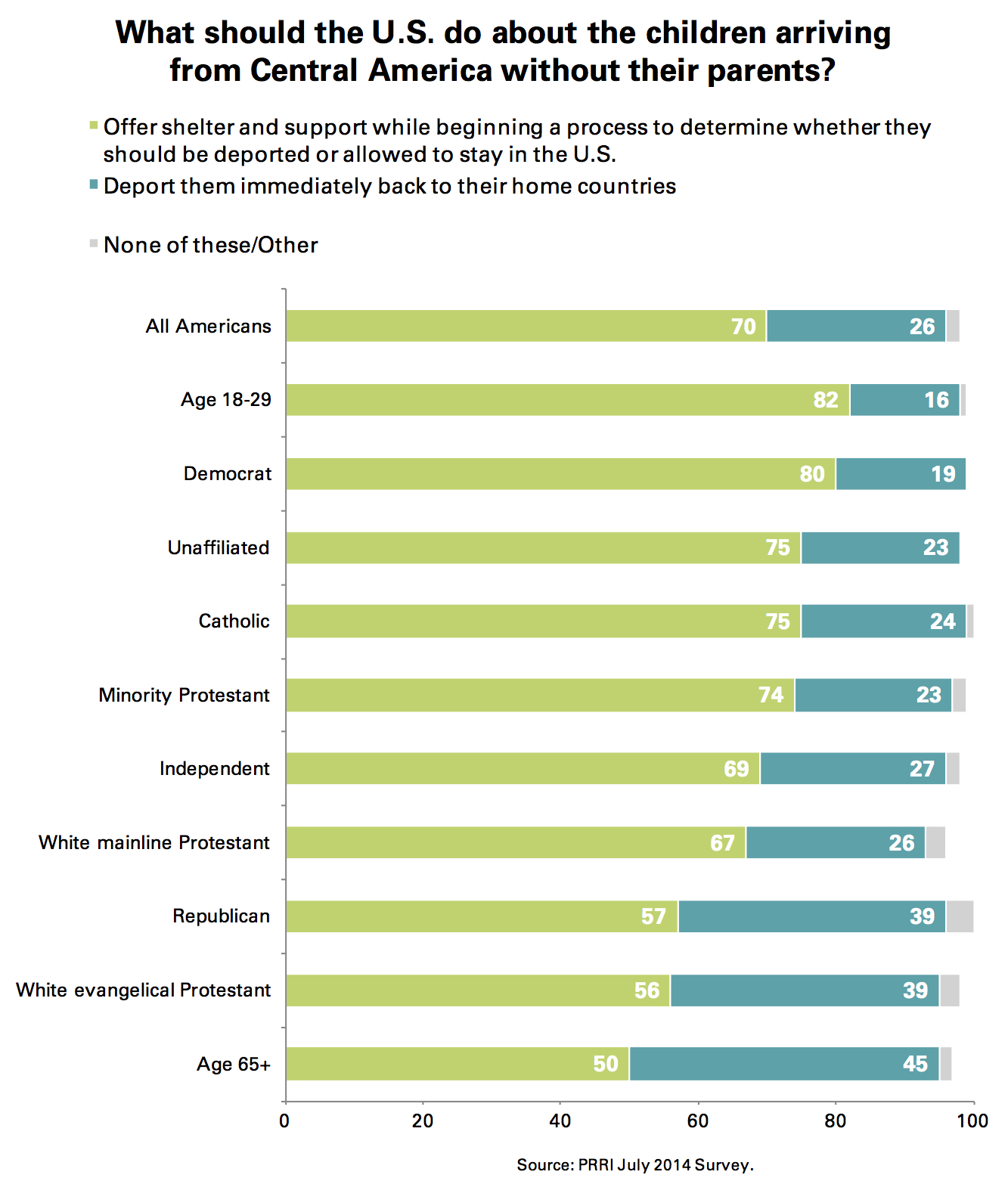I. Are the Children Coming from Central America a Crisis?
Roughly half (49%) of Americans report hearing a lot about the growing numbers of children arriving in the United States from Central America, while 31% report only hearing a little, and 20% report hearing nothing at all.
More than one-third (36%) of Americans view the number of children now coming from Central America as a crisis, while 43% see the situation as a serious problem but not a crisis. About 1-in-5 (19%) say the situation is a minor problem.
A majority (69%) of Americans say that children arriving from Central America should be treated as refugees and allowed to stay in the U.S. if authorities determine it is not safe for them to return to their home countries. In contrast, 27% say that children arriving from Central America should be treated as illegal immigrants and deported back to their home countries.
Majorities of Democrats (83%) independents (66%), and Republicans (52%) believe these children should be treated as refugees, but Republicans are more divided; 42% of Republicans believe they should be treated as illegal immigrants.
II. What Should U.S. Government do about Unaccompanied Children?
When asked how the U.S. should respond, 7-in-10 (70%) Americans say the U.S. should offer shelter and support to children coming from Central America while beginning a process to determine whether they should be deported or allowed to stay. However, more than 1-in-4 (26%) Americans believe these children should be deported immediately back to their home country.
Majorities of Democrats (80%), independents (69%), and Republicans (57%) favor offering support to unaccompanied children while a process to review their cases gets underway. However, nearly 4-in-10 (39%) Republicans favor deporting these children immediately back to their home countries.
Majorities of all major religious groups—including white evangelical Protestants (56%), white mainline Protestants (67%), minority Protestants (74%), Catholics (75%), and the religiously unaffiliated (75%)—prefer that the government offer these children shelter and support while their cases are being decided.
More than 8-in-10 (82%) young adults (age 18 to 29) say the U.S. should offer support to these children while beginning a process to review their cases. In contrast, seniors (age 65+) are divided over whether they should be deported immediately (45%) or allowed do stay while their cases are being reviewed (50%).
Approximately 7-in-10 (71%) Americans agree with the general principle of offering refuge and protection to those who come to the U.S. fleeing serious danger in their home countries.
Approximately 7-in-10 (71%) Americans agree that while children from Central America are waiting for their cases to be heard, they should be released to the care of relatives, host families or churches, rather than be detained by immigration authorities.
III. Why Are Children Coming to the U.S. from Central America?
A majority (56%) of Americans believe Central American families are mostly trying to keep their kids safe in difficult circumstances, while 38% say these families are taking advantage of American good will and are trying to find a back door for immigrating to the country. However, there are large partisan divisions on this question:
Nearly 7-in-10 (69%) Democrats and a majority (54%) of independents say families are primarily trying to keep their children safe.
In contrast, about 4-in-10 (41%) Republicans agree that families are primarily trying to keep their children safe; a majority (52%) of Republicans believe families are primarily seeking a back door to immigrate to the U.S.
Americans have some ambivalence about the root causes of the increased number of children arriving from Central America at the border and hold concerns about the long-term effects of this situation.
Americans are divided about whether the unaccompanied children are coming to escape violence and threats to their safety (45%) or seeking better economic and educational opportunities generally (34%).
Nearly 6-in-10 (59%) Americans agree that if we allow the unaccompanied children to stay in the country, this will encourage others to ignore our laws and increase illegal immigration.
There is also some evidence that the news about unaccompanied minors at the border has had a negative influence on American attitudes about immigrants generally. In early July, 55% of Americans said immigrants strengthen American society with their hard work and talents, compared to 49% today. Over the same time period, the number of Americans who believe immigrants are a burden because they take our jobs, housing and health care has increased from 35% to 42%.
However, the decline in positive views of immigrants has had no impact on support for a policy that would allow a path to citizenship for immigrants living in the country illegally. In early July, 58% of Americans said they preferred a policy that allows immigrants living in the country illegally to become citizens provided they meet certain requirements, compared to identical support (58%) today.
Recommended citation:
Jones, Robert P., Daniel Cox, and Juhem Navarro-Rivera. “Nearly 7-in-10 See Unaccompanied Children Coming to U.S. as Refugees, Not Illegal Immigrants.” PRRI. 2014. http://www.prri.org/research/july-2014-unaccompanied-minors/.



